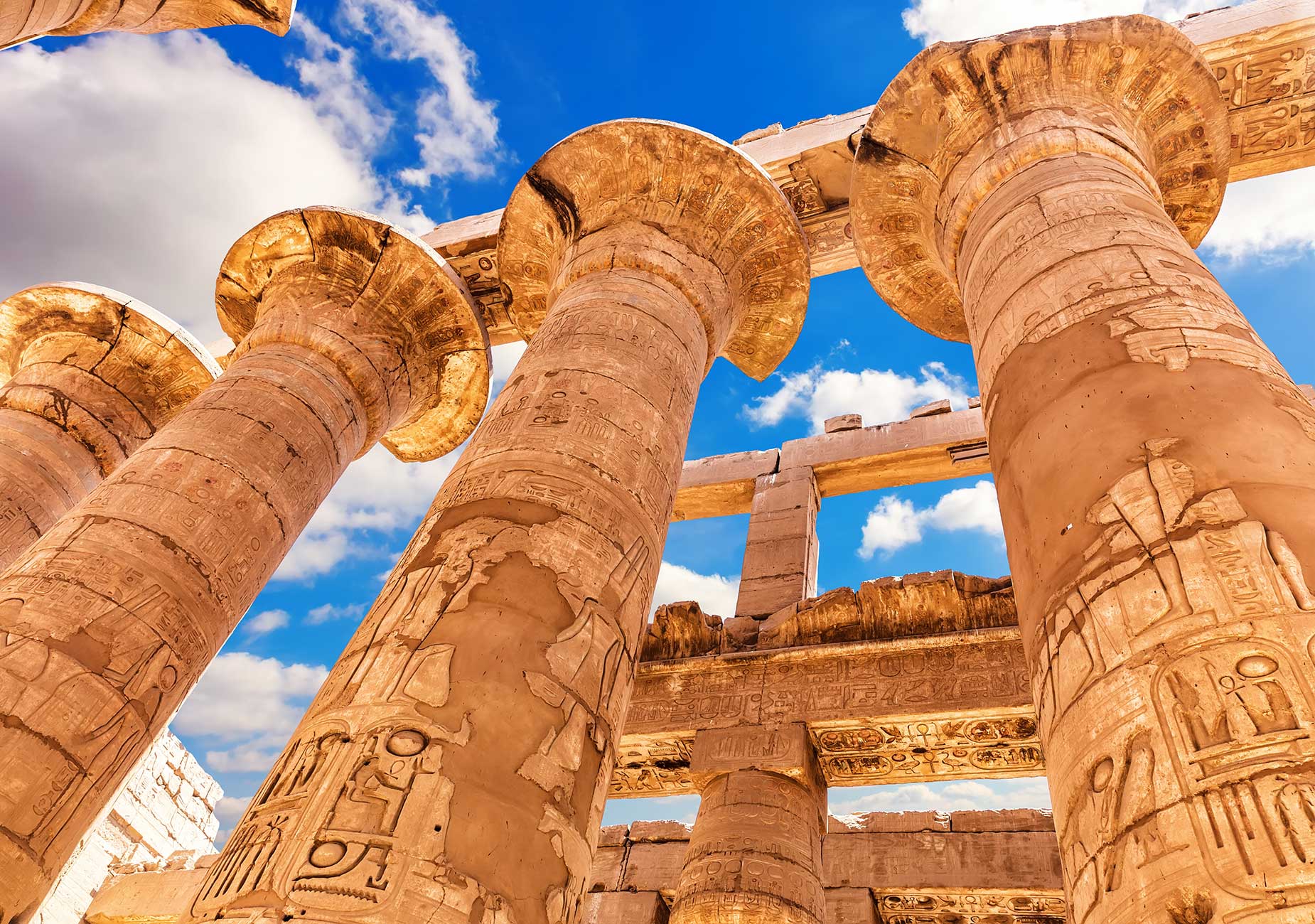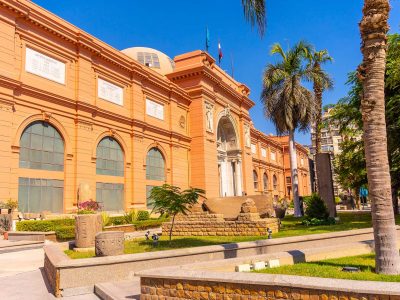9 Days in Cairo, Luxor, and Aswan
Offered in English - Small Group
- Exploring Luxor and Karnak Temples, marveling at the ancient architecture and colossal statues
- Discovering the Valley of the Kings, exploring well-preserved tombs and intricate paintings
- Visiting the Temple of Queen Hatshepsut, admiring its terraces and reliefs
- Exploring the Temple of Horus in Edfu, one of the best-preserved temples in Egypt
- Visiting the unique Temple of Kom Ombo, dedicated to Sobek and Horus
- Witnessing the beauty of the Temple of Queen Nefertari in Abu Simbel
- Exploring Philae Temple, relocated to Agilkia Island, and bidding farewell to the cruise ship
- Visiting the Giza Plateau, marveling at the pyramids and the Sphinx
- Exploring Saqqara and its well-preserved pyramids, including the Pyramid of Djoser
- Discovering the historical charms of Cairo, including the Museum and Mosque of Mohamed Ali
Itinerary
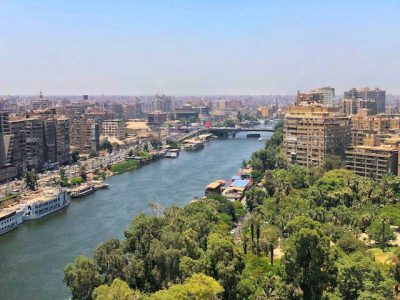
Day 1: Arriving in Cairo and Checking In
When you arrive at Cairo International Airport, your Egyptian adventure begins. As you step off the plane, the excitement of exploring ancient wonders and experiencing vibrant culture fills the air. Our team will be there to greet you and ensure your smooth transition from the airport to your hotel. From the moment you arrive, we aim to provide you with exceptional service and a memorable stay.
Upon arrival at your hotel, you will be warmly welcomed and assisted with the check-in process. We understand the importance of a comfortable and convenient accommodation, and we have handpicked hotels that offer excellent amenities and a relaxing atmosphere. Settle into your room, freshen up, and get ready for the incredible journey that lies ahead.
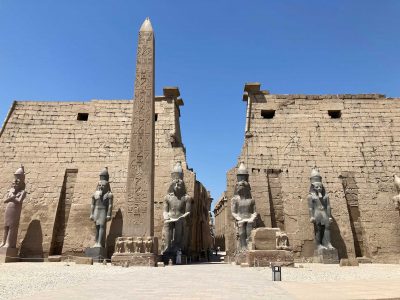
Day 2: Exploring Luxor and Karnak Temples
Today, we embark on a journey to Luxor, the ancient city of Thebes. Luxor holds a treasure trove of archaeological wonders and historical significance. After arriving in Luxor, you will be transported to a unique and enchanting floating hotel. The check-in process will be swift and seamless, allowing you to start your exploration without delay.
Once settled in, we will treat you to a delicious lunch before beginning our excursions to Luxor and Karnak temples. The awe-inspiring Luxor Temple awaits, situated in the city of 100 Gates, as it was known in Arab times. Dedicated to the triad of gods Amun, Mut, and Khonsu, this temple was constructed during the New Kingdom of ancient Egypt. Marvel at the 15-meter-high colossal statues of the great King Ramses II and the magnificent 25-meter-high obelisk that adorn the gateway to the inner part of the temple.
As we move forward, a 3-kilometer-long avenue of sphinxes will lead us to the Karnak Temple complex. This vast complex spans approximately 60 hectares and stands as one of Egypt's most important highlights. Dedicated primarily to the god Amun-Re, the temples within Karnak hold a rich history that spans thousands of years. Marvel at the architectural wonders, explore the sanctuaries dedicated to various deities, and immerse yourself in the vibrant atmosphere of this ancient site.
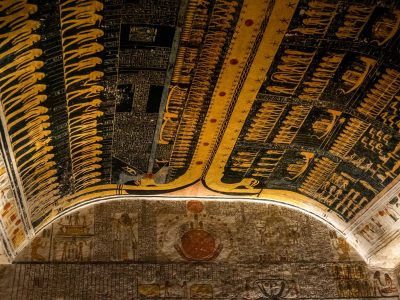
Day 3: Discovering the Valley of the Kings and Temple of Queen Hatshepsut
After a memorable evening on the floating hotel, enjoying exquisite meals and delightful drinks, it's time to set out on an early morning adventure to the west bank of Luxor. Here, you will discover the Valley of the Kings, a burial ground for pharaohs and their magnificent funerary temples.
Our expert Egyptologist guide will lead the way, taking you across the river via a bridge and passing by the impressive Colossi of Memnon. These colossal statues are remnants of a once-magnificent funerary temple, and their grandeur will captivate your imagination. A short drive of approximately 5 kilometers will transport you to the site chosen by the pharaohs of the New Kingdom to conceal their mummies, treasures, and sacred texts from tomb robbers.
As you explore the Valley of the Kings, prepare to be mesmerized by the well-preserved colors and intricate paintings adorning the tombs. Each tomb tells a unique story, allowing you to glimpse into the lives of the pharaohs who once ruled Egypt.
Next, we visit the Temple of Queen Hatshepsut, one of the many funerary temples in the capital of the New Kingdom. Queen Hatshepsut dedicated this temple not only to her own funerary rituals but also to the king of the gods, Amun-Ra, who legitimized her reign. Designed by the legendary architect Senenmut, this temple stands as a masterpiece of ancient Egyptian architecture.
Marvel at the temple's terraces, nestled against the towering cliffs, and admire the beautifully preserved reliefs that depict the life and achievements of Queen Hatshepsut. As you explore the temple, you'll learn about her remarkable reign and the challenges she faced as a female pharaoh.
After immersing yourself in the wonders of the Valley of the Kings and the Temple of Queen Hatshepsut, we will return to the floating hotel for a relaxing evening and a sumptuous dinner.
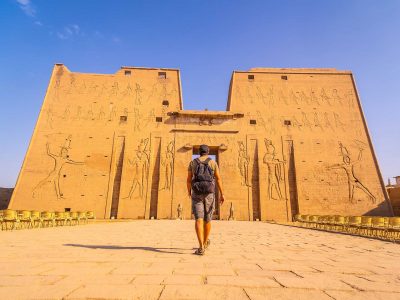
Day 4: Sailing the Nile and Visiting Edfu and Kom Ombo Temples
Today, we embark on a fascinating journey along the majestic Nile River. After breakfast on the floating hotel, we will board a traditional Nile cruise ship, your luxurious home for the next few days. Settle into your comfortable cabin and prepare for a delightful cruise experience.
As we sail upstream, enjoy the picturesque scenery of the Nile's fertile banks, dotted with villages and ancient temples. Our first stop will be the Temple of Horus in Edfu, one of the best-preserved temples in Egypt. Dedicated to the falcon-headed god Horus, this temple offers a captivating glimpse into the religious beliefs and rituals of ancient Egyptians.
Explore the grand halls, courtyards, and sanctuaries of the temple, and marvel at the intricate hieroglyphics and colossal statues that adorn its walls. Your guide will provide fascinating insights into the significance of each architectural element and the role of the temple in ancient Egyptian society.
Afterward, we continue our cruise to Kom Ombo, where we visit the unique Temple of Kom Ombo. What makes this temple truly special is its dedication to two gods—Sobek, the crocodile god, and Horus, the falcon-headed god. Take in the symmetrical design of the temple, divided into two identical sections, each dedicated to one of the deities.
Admire the well-preserved reliefs and fascinating crocodile mummies housed in the Crocodile Museum adjacent to the temple. Learn about the reverence ancient Egyptians had for Sobek and the importance of the Nile River in their daily lives.
In the evening, as the Nile cruise ship continues its voyage, enjoy a delightful dinner accompanied by traditional music and entertainment on board.
Stay tuned for the next part of the itinerary as we continue our adventure through ancient Egypt.
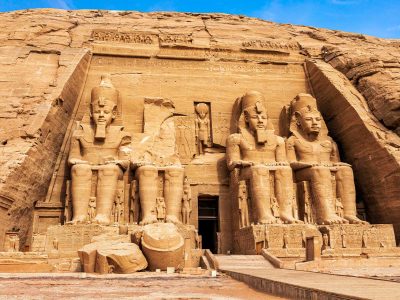
Day 5: Exploring Aswan - A Gem on the Borders of Sudan
Arrival in Aswan, the captivating last governorate in Upper Egypt, situated on the frontiers of Sudan. With its rocky landscapes and charming small waterfalls nestled within the Nile, this beautiful city serves as a remarkable extension of Africa.
Abu Simbel: The Temple of Queen Nefertari
On the western side of Nasser Lake, lies the majestic Abu Simbel temple, dedicated to the beautiful Queen Nefertari. This architectural marvel was built by Ramses II, the great king of the 19th dynasty. The temple, dating back to approximately 1256 B.C., stands as a testament to Ramses II's reign, possibly in its 24th year. Abu Simbel offers numerous wonders waiting to be discovered. Admire the colossal statues that adorn the temple's facade, witness the annual phenomenon of sunlight illuminating the statue of the king through the temple's corridors, and marvel at the incredible feat of relocating the entire temple due to the construction of the High Dam.
The High Dam: A Triumph of Engineering
Not far from downtown Aswan, you will find the remarkable High Dam. Constructed in the 1960s, this engineering marvel is the largest embankment in the world. Before the dam's construction, the annual floods of the Nile posed a constant threat to the Egyptian people, severely impacting agriculture. However, the High Dam brought about numerous benefits. It ensures continuous irrigation, generates electricity, and creates the vast Lake Nasser, a natural and magnificent reserve of fresh water.
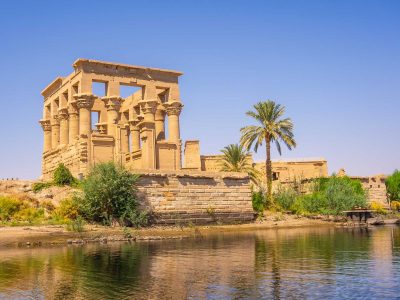
Day 6: Journey to Philae Temple and Onward to Cairo
Embark on an enchanting visit to Philae Temple, a complex of ancient monuments that was relocated from its original island of Philae to Agilkia Island. The relocation became necessary due to the construction of a high dam in the 1970s. The temple complex, once threatened by sinking due to the Aswan Low Dam built in 1902, now stands preserved on Agilkia Island. Among the notable structures on the island is the renowned temple constructed by the pharaohs and later rebuilt during the Greek era by Nektanebu (380-362 B.C.), dedicated to the goddess Isis. After this captivating visit, you will bid farewell to the ship and head towards Cairo, where our tour leader will receive you and escort you to your hotel.
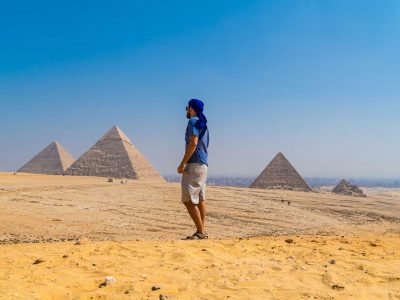
Day 7: Discovering the Treasures of Giza Plateau
Get ready to immerse yourself in the wonders of the Giza Plateau, home to the oldest of the seven wonders of the ancient world. Marvel at the panoramic view of the pyramids and be captivated by the colossal Sphinx, an awe-inspiring monument with the body of a lion and the head of a human. During your visit, our knowledgeable tour guide will enlighten you about the development and symbolism of the pyramids, which took on different shapes starting from 4500 B.C.
Saqqara: A Window into Ancient Egypt's History
Explore the well-preserved pyramids of the first Egyptian intermediate period at Saqqara. Among these is the Pyramid of Djoser, considered the oldest dressed stone monument. The complex of Saqqara boasts a wealth of monuments, funerary ruins, and pyramids, providing insights into the history of great kings. One of the most recent discoveries at Saqqara dates back to 2008. Located 20 km south of Giza, Memphis, or Manf, served as the first known capital of lower Egypt during the time of the Old Kingdom. It played a significant political and religious role throughout ancient Egyptian history. Visit the remains of monuments that depict the deities and monarchs of Memphis, now known as the village of Mit Rahina. The most venerated gods worshipped here are Ptah and Hathor.
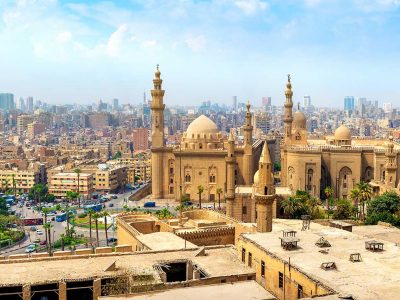
Day 8: Unveiling the Historic Charms of Cairo
As you step into Cairo, you'll be mesmerized by the city's rich historical tapestry. With over 20 million inhabitants, Cairo embodies the legacies of different eras, including ancient Egyptian, Greek, Roman, Christian, Coptic, and Islamic influences. On this day, we invite you to embark on a captivating excursion to one of Cairo's Islamic historical attractions, the Museum and Mosque of Mohamed Ali. Built between 1176 and 1183 by Sultan Salahuddin, the citadel complex was intended to safeguard Cairo against potential crusader attacks. The Mosque of Mohamed Ali, constructed by Mohamed Ali himself between 1830 and 1843, follows the model of the Sultan Ahmed Mosque in Turkey, showcasing breathtaking architectural beauty.

Day 9: Farewell to Cairo
On the last day of your trip, you will need to complete the check-out process at your hotel and make arrangements for transportation to the airport, as you continue your journey to your next destination. Checking out involves settling any outstanding bills or charges at the hotel reception desk and returning any room keys or access cards that you may have been given during your stay. Once the check-out process is complete, it is important to ensure that you have organized transportation to the airport, either through a pre-arranged service or by hailing a taxi or ride-sharing service. This will ensure that you reach the airport in a timely manner, allowing you to catch your onward flight or continue your travels smoothly.
Included
- Airport pick-up and transfer to the hotel in Cairo
- Accommodation in carefully selected hotels throughout the tour
- Guided tours and entrance fees to Luxor Temple, Karnak Temple, Valley of the Kings, Temple of Queen Hatshepsut, Temple of Horus in Edfu, Temple of Kom Ombo, Philae Temple, Giza Plateau, Saqqara, and the Museum and Mosque of Mohamed Ali
- Nile cruise experience with comfortable cabin accommodations and onboard meals
- Professional Egyptologist guides providing insights and commentary throughout the tour
- Meals as specified in the itinerary, including breakfast, lunch, and dinner
- Transportation in comfortable vehicles for all transfers and excursions
- Assistance with check-in and check-out processes at hotels
Excluded
- Personal expenses such as souvenirs, additional meals, beverages, and snacks
- Optional activities or excursions not mentioned in the itinerary
- Gratuities for guides, drivers, and hotel staff
- Any additional accommodation or transportation not included in the tour itinerary
- Any other items or services not explicitly mentioned as included

